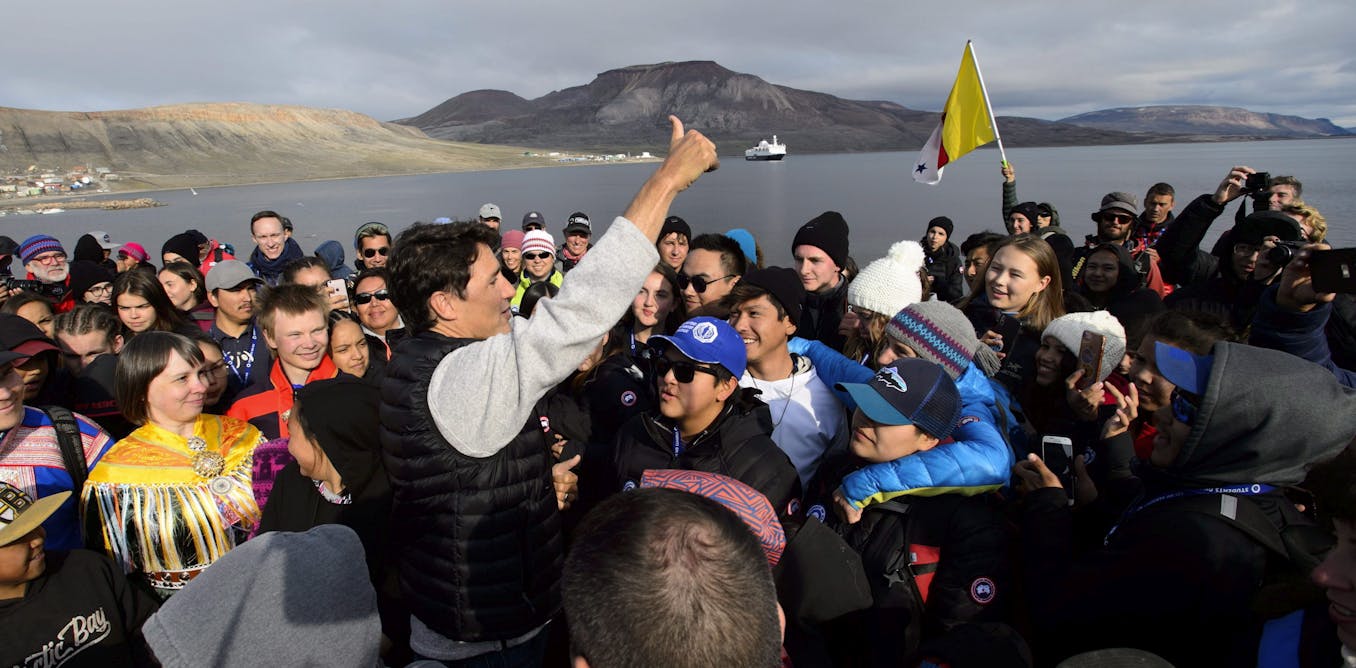Indigenous justice and reconciliation barely on the radar this canadian election
Indigenous justice and reconciliation barely on the radar this canadian election"
- Select a language for the TTS:
- UK English Female
- UK English Male
- US English Female
- US English Male
- Australian Female
- Australian Male
- Language selected: (auto detect) - EN
Play all audios:
The relationship between Indigenous Peoples and Canadians seems to have captured the public’s attention over the past four years, particularly following the release of the recommendations of
the Truth and Reconciliation Commission as well as the National Inquiry into Missing and Murdered Indigenous Women and Girls. Justin Trudeau’s government has also ostensibly prioritized
these issues, with the prime minister asserting: > “No relationship is more important to me and to Canada than the > one with Indigenous Peoples.” But has there been attention paid to
Indigenous issues by party candidates during the current election campaign? More specifically, will Canada’s relationship with Indigenous Peoples be treated as a matter of national interest,
or will most of the attention come from ridings with a significant proportion of Indigenous voters? According to our mid-campaign analysis, it’s fair to conclude that most settler
candidates aren’t considering the relationship important. Our research aggregates tweets written by 735 candidates from five political parties (Liberal, Conservative, NDP, Green and Bloc
Québécois) on Twitter. At mid-campaign, of the 28,338 tweets by these candidates, only two per cent of them made reference to Indigenous issues. And although reconciliation was the focal
point of the Trudeau government’s Indigenous policy, it only ranks 11th among the most discussed topics, far behind issues such as water, climate and housing. SPORADIC ATTENTION In addition,
the attention has also been sporadic, with most of the tweets the result of the leaders’ debate organized by _Maclean’s_ and Citytv on Sept. 12, and a climate proposal announcement by the
Liberals on Sept. 24. Candidates were active the day after the debate, posting numerous messages on Twitter, as well as the day of the Liberal announcement and the day after. The attention
paid to Canada’s relationship with Indigenous Peoples also varied depending on partisan affiliations. Here, the amount of attention granted to these issues followed the left-right
ideological continuum. The further left on the spectrum, the more attention was paid to Indigenous issues in the political messaging. Hence, the Conservative Party trailed all other parties
by a considerable margin: Other indicators suggest a geographically fragmented situation, and that issues related to Canada’s relationship with Indigenous Peoples are not treated as national
interest issues. A majority of tweets originated from candidates running in ridings with a significant proportion of Indigenous voters. For example, candidates in ridings located in the
northern areas of provinces, such as Timmins-James Bay, Labrador, Desnethé-Missinippi-Churchill River, were quite active in communicating on Indigenous issues. We see a similar trend in some
urban ridings with large Indigenous populations, like Vancouver Centre, Regina-Wascana, Winnipeg Centre. LOOKING FOR VOTES? This observation indicates that social media posts were aimed at
attracting the support of a key demographic that could tip the balance in specific ridings. Indigenous issues have not yet been raised by the majority of candidates to the status of national
interest issues able to mobilize voters from across the country. We think this is short-sighted, and fails to serve the urgent needs for safety, health, wellness and prosperity in
Indigenous communities and to improve relations between Indigenous and non-Indigenous people in Canada. It’s also strange to see the high-level national attention paid to the Truth and
Reconciliation Commission and the Inquiry into Missing and Murdered Women by many politicians has dwindled during an election campaign. Campaigns offer the opportunity to debate issues of
national interest, and reconciliation with Indigenous People should be front and centre this election campaign. Let’s hope that political parties do better in the second half of the
campaign. [ _You’re smart and curious about the world. So are The Conversation’s authors and editors._ You can read us daily by subscribing to our newsletter. ]
Trending News
Man united transfer debt hits record levels after £218m summer splurgeFINANCIAL FIGURES RELEASED BY MAN UTD THIS WEEK HAVE REVEALED HOW MUCH MONEY THEY OWE CLUBS FOR TRANSFER FEES STILL OUTS...
IOT Innovation - IO What?[embedded content] The Internet of Things has become part of the vocabulary of not just the wireless and tech sector, bu...
North sea ‘taxed to death’, warns sir jim ratcliffeAdam Mawardi 15 May 2023 11:00pm BST Sir Jim Ratcliffe has warned that taxing the North Sea oil and gas industry “to dea...
Dgp reviews security situation in south kashmirDirector General of Police (DGP) Dilbag Singh on Tuesday took stock of security situation in south Kashmir districts. Si...
Manipur: after 7 months, 4 bodies airlifted from c'pur to imphalImphal: Months after the Manipur violence erupted on May 3, four bodies of people from the Meitei community were airlift...
Latests News
Indigenous justice and reconciliation barely on the radar this canadian electionThe relationship between Indigenous Peoples and Canadians seems to have captured the public’s attention over the past fo...
Strategies to determine the biological function of micrornasABSTRACT MicroRNAs (miRNAs) are regulators of gene expression that control many biological processes in development, dif...
Dodgers' dan haren gives a baffling effort in 2-1 win over angelsThe Angels knew Dan Haren well from the 21/2 years he spent in Anaheim from 2010 to 2012, and the right-hander they reme...
Mineral resources of the united statesABSTRACT THIS book consists of a series of essays, of various de grees of importance, on the mining and metallurgic indu...
404 - Page not foundHomeNG HindiIndiaIndiaAndhra PradeshArunachal PradeshAssamBiharChhattisgarhGoaGujaratHaryanaHimachal PradeshJharkhandKar...
